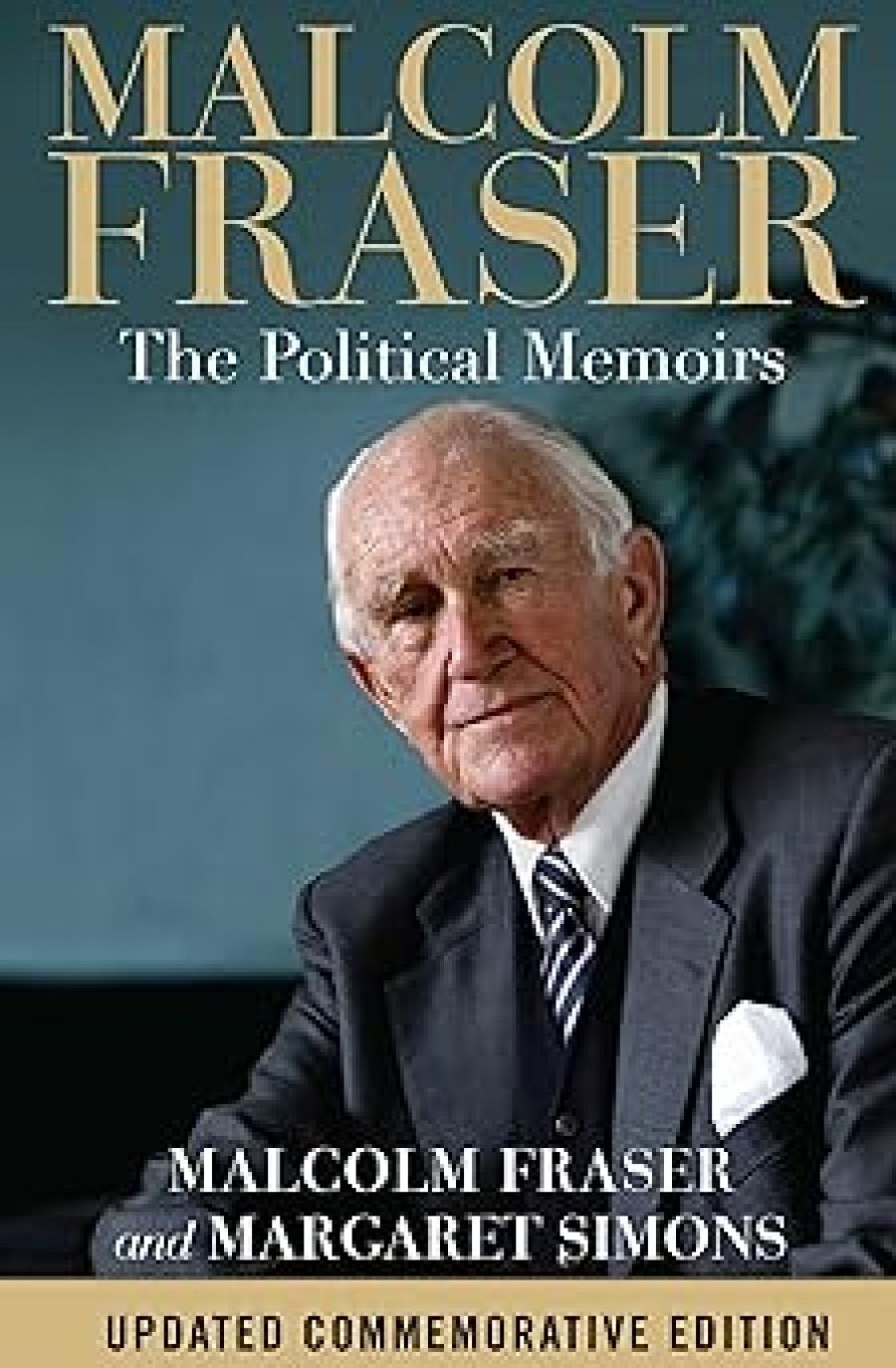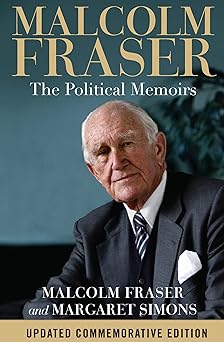
- Free Article: No
- Contents Category: Memoir
- Review Article: Yes
- Article Title: Vindicating Malcolm
- Article Subtitle: Demonology from the left and right
- Online Only: No
- Custom Highlight Text:
It is unusual for a political leader to figure in the demonology of both the left and the right. Malcolm Fraser bears that distinction. For Labor he was the arrogant Western District squire, trampling on the rights of the workers; the hardline Cold War warrior and the abuser of the constitution. For Liberals he was the leader who denied them their Thatcherite moment in the sun and who, embittered by early retirement, decried their principles and their hero, John Howard. These memoirs are, above all, Fraser’s repudiation of these mythologies. The book is a strange hybrid, Fraser’s response being mediated by the journalist and writer Margaret Simons into a third-person narrative. In modern times, only Charles de Gaulle has dared such effrontery.
- Book 1 Title: Malcolm Fraser
- Book 1 Subtitle: The political memoirs
- Book 1 Biblio: Miegunyah Press, $59.99 hb, 863 pp
- Book 1 Cover Small (400 x 600):

Fraser confronts the elements of this demonology in a number of ways. On ‘rugged individualism’, while there is a lengthy exegesis on the context of the original quote, he says very little. While under Fraser there was much talk of ‘razor gangs’, ‘slashings’ and ‘burnings’, Fraser, despite his hard-man image, did little to reverse Whitlamite social welfare; on the other hand, apart from replacing tax rebates for children with the less regressive child allowances, he did little that was creative. On social welfare, the Fraser period represents a hiatus between the cloudburst of reform under Whitlam and the more cautious and considered policies of the Hawke–Keating governments. The claim that he ‘retained Medibank’ is simply mendacious. By 1983 Medibank had been completely gutted, making Australia the only country in the developed world which, having adopted universal health coverage, then abandoned it.
On other issues – Vietnam, for example – Fraser’s position is more nuanced. Today he believes that ‘perhaps Australia should never have gone to Vietnam. It probably was a wrong decision.’ Yet even now he ‘does not think it was wrong to advocate war, based on what the Australian Government knew at the time’. But what Fraser knew or believed at the time is pretty obscure. On page 136 he seems to deny the domino theory; on page 145, to accept it. On page 132 he alleges that ‘the distinction between communism and nationalism … at the time … wasn’t even on the agenda’, yet this distinction was at the very heart of the moderate anti-war movement. And given his influential international connections, it seems disingenuous to claim that it was not until 1995 that he learnt that the CIA and the US government were complicit in the assassination of the South Vietnamese leader Ngo Dinh Diem in 1963. However, what does emerge from these tortuous pages is a Fraser increasingly unhappy at being chained to an imperial strategy in which Australia had no say. This helped fuel a growing disenchantment with US foreign policy, which in turn informs his retrospective views on the Vietnam War.
On one subject – the constitutional crisis of 1975 – he yields no ground to his critics. We get the full Fraser perspective on the constitutional crisis: the forces within the conservative community for and against the withholding of supply; Fraser’s confidence that his Senate numbers would hold; his Pontius Pilate-like washing of his hands over the dubious appointments of Senators Bunton and Field that made his stand possible; and his perceptive understanding and masterly handling of Sir John Kerr.
Further fuel is added to the controversy over the fateful phone call that Kerr made to Fraser at 9.55 a.m. on 11 November. Kerr’s account suggests a short phone call to ascertain whether there had been any change in the Opposition’s position. Fraser’s account suggests a more substantial conversation which allowed him to conclude that, if Whitlam remained obdurate, he would be sacked. Thus Fraser was given an insight into the governor-general’s intentions denied to the prime minister. When interviewed on this matter by Paul Kelly in May 1995, Fraser said that he had ‘take[n] a few notes [of the telephone conversation] on a piece of paper which I haven’t kept, I promise you that’. Those notes, on the back of the agenda for that morning’s joint party meeting, have now turned up and earn a picture in the Memoirs. Some would see this discovery as serendipitous; others as suspicious.
Fraser was reluctant to address 1975 until his co-author, standing up to him for once, persuaded him that it was not possible to write his story without addressing the Dismissal. His reluctance did not spring from any regrets. For him, 1975 was a climax of accumulation: crises piled on crises, scandals upon scandals, a stricken economy, the speed of change, the untrustworthiness of ministers. For Fraser, ‘the country was in extremis ...’ He could not wait for the normal electoral cycle: ‘the damage would have been too deep … [t]he economy might never have recovered.’ It all seems a trifle overblown, but then, Fraser and his critics are never likely to agree on 1975.
But Fraser’s chief response to his leftist critics has been to emphasise all those aspects of his record that their demonology neglects: his dedication to civil rights, his commitment to multiculturalism, his practical abhorrence of all forms of racism, his moral stature on the matter of the boat people. So bitterly divisive was the constitutional fracas of 1975 that many fail to recognise how seamless, in so many areas, was the transition between Whitlam and Fraser.
Fraser completed much of the Whitlam agenda on human rights, appointing the first ombudsman, establishing the Human Rights Commission, setting up the Administrative Appeals Tribunal and establishing judicial review of administrative decisions. In December 1982 Australia became the first country in the Westminster tradition to have freedom of information laws. If Whitlam developed the concept of multiculturalism, Fraser gave it practical effect in the Special Broadcasting Commission. Similarly, with the environment Fraser took up and implemented the reports of commissions set up by Whitlam on Fraser Island sand mining and on Kakadu, while he proclaimed, partially and somewhat tardily, portions of Whitlam’s Great Barrier Reef Marine Park. In power, Fraser confirmed Whitlam’s commitment to self-determination for Aborigines, passed Whitlam’s stalled legislation for land rights in the Northern Territory and fought Bjelke-Petersen over Aboriginal rights in the Aurukun and Mornington Island reserves. His government established the Aboriginal Development Commission as a bank for funding Aboriginal enterprises and initiated the long-running Community Development Employment Project. The Aboriginal leader Charles Perkins thought him ‘absolutely A1. He was the tops … the best of them all.’
On Vietnamese refugees, Fraser resisted apocalyptic departmental predictions, public clamour to turn the boats back, demands to set up ‘reception centres’ and widespread unease about the numbers of Asian immigrants. During his period in government, Australia admitted nearly 70,000 Indo-Chinese refugees, 2059 of them boat people. It was moral statesmanship of a high order. Internationally, he displayed the same anti-racism. He led the old dominions in the Commonwealth in framing the compromises that preserved its unity over apartheid, and was instrumental in the solution of the crisis in Zimbabwe. A Labor government made him an Eminent Person and campaigned for him to become secretary-general of the Commonwealth. In the eyes of many Liberals, he had become a fellow traveller.
One major strand in Liberal demonology sees Fraser as a man embittered by his early fall from power who has devoted much of his retirement to betraying his own party. One prominent Liberal has accused him of being ‘a frothing at the mouth lefty [guilty of] nauseating acts of political sycophancy [and] hypocrisy’. Fraser’s essential response is that his party has deserted its own principles. In many instances, this is difficult to deny. His condemnation of Howard and Philip Ruddock over the boat people, his denunciation of the Howard–Brough Aboriginal intervention and Howard’s stance on the Stolen Generations, his criticism of the weakness of the Howard response to Pauline Hanson, are not belated thoughts in retirement but stem from the very principles and practises of his own government.
Two of his retirement stances – support for the republic and disenchantment with US foreign policy – are more problematic. Nothing in his past suggested republican instincts, indeed rather the contrary, so it was surprising when he came out as a republican in 1995. His explanation for this conversion is rather thin, though it contains a sympathetic reflection on Kerr’s predicament in 1975.
There is an apparent inconsistency between the fervent ally of the United States in his years of power and the equally fervent critic of George W. Bush and his foreign policy in the first decade of the twenty-first century. Yet many a hardline realist Cold War warrior – including Fraser’s own foreign policy adviser when prime minister, Owen Harries – have followed a similar trajectory in their disillusionment with neo-conservative foreign policy. Fraser is in good conservative company.
The second element in Liberal demonology concerns Fraser in power rather than in retirement. ‘He could have been our Maggie or our Ronny’ runs the lament, ‘and led us to the Promised Land but he lacked neo-liberal conviction and left the 1980s to the enemy’. In one of the most impressive and fully researched chapters, the authors seek to rebut the charge, claiming that Fraser laid the foundations for the economic reforms of the Hawke–Keating period. Yet all the chapter really proves is how limited were the changes by contrast with what was to come, and how tardy their development. Despite much discussion, the Fraser government got no further than a flexibly managed exchange rate, the so-called ‘dirty float’. It took four and a half years from the initial discussions to set up a tender system for Commonwealth bonds. Cabinet decided in February 1978 to have a major inquiry into the financial system: it did not get terms of reference until July; the Campbell committee was not established until January 1979; it did not present its final report until late 1981 and the report was still being assessed when the government fell. On tariffs, the government had nothing to show while labour market deregulation was not on the agenda. ‘There had been a staggering amount of paper, consideration and reconsideration, followed by calls for more reports and information.’ Procrastination was the order of the day.
One other reputation is skewered in this chapter. John Howard as treasurer has frequently been presented as valiantly battling for the neo-liberal cause against the deadweight of Fraser’s economic conservatism. This is not the picture presented here. Rather, the dynamic for change came from Fraser and his personal advisers, with resistance coming from the Treasury and Reserve Bank mandarins and with Howard playing an equivocal, but certainly not a dynamic, role. The stake is driven in when, contrasting the disappointing record of the Fraser government with the deregulatory achievements of its successor, the authors write: ‘One of the key differences was surely the presence of an activist Treasurer, prepared to take strong positions and argue for them.’
Like all of us, Malcolm Fraser is a flawed individual whose misfortune it has been to have had his flaws magnified by the demonologies of both left and right. His efforts to escape the mythologies in which he is encased are potentially engrossing. They would have been more so if his co-author had been more successful in forcing him to face up to the more unpalatable aspects of his career, in subjecting his defences to more rigorous appraisal and in curbing the politician’s inherent tendency to verbosity. Malcolm’s struggle with his devils would have been more compelling at half the length.


Comments powered by CComment